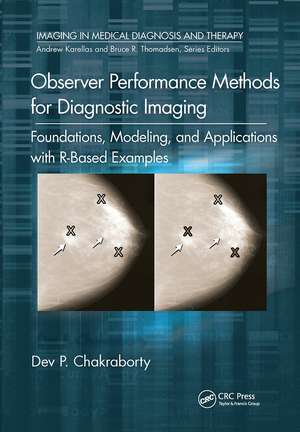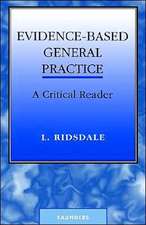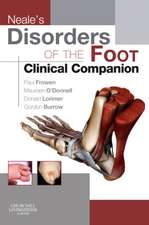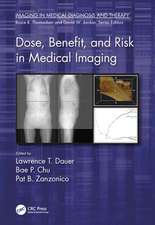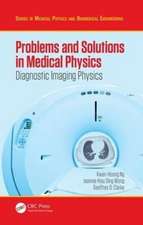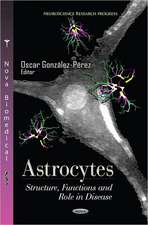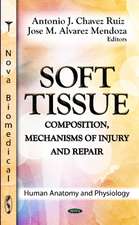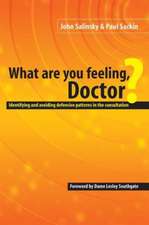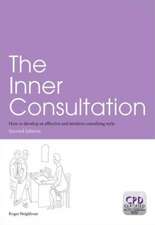Observer Performance Methods for Diagnostic Imaging: Foundations, Modeling, and Applications with R-Based Examples: Imaging in Medical Diagnosis and Therapy
Autor Dev P. Chakrabortyen Limba Engleză Paperback – 31 mar 2021
– from the Foreword by Prof. Harold L. Kundel, Department of Radiology, Perelman School of Medicine, University of Pennsylvania
"This book will benefit individuals interested in observer performance evaluations in diagnostic medical imaging and provide additional insights to those that have worked in the field for many years."
– Prof. Gary T. Barnes, Department of Radiology, University of Alabama at Birmingham
This book provides a complete introductory overview of this growing field and its applications in medical imaging, utilizing worked examples and exercises to demystify statistics for readers of any background. It includes a tutorial on the use of the open source, widely used R software, as well as basic statistical background, before addressing localization tasks common in medical imaging. The coverage includes a discussion of study design basics and the use of the techniques in imaging system optimization, memory effects in clinical interpretations, predictions of clinical task performance, alternatives to ROC analysis, and non-medical applications.
Dev P. Chakraborty, PhD, is a clinical diagnostic imaging physicist, certified by the American Board of Radiology in Diagnostic Radiological Physics and Medical Nuclear Physics. He has held faculty positions at the University of Alabama at Birmingham, University of Pennsylvania, and most recently at the University of Pittsburgh.
| Toate formatele și edițiile | Preț | Express |
|---|---|---|
| Paperback (1) | 436.14 lei 43-57 zile | |
| CRC Press – 31 mar 2021 | 436.14 lei 43-57 zile | |
| Hardback (1) | 1250.55 lei 22-36 zile | +46.04 lei 6-12 zile |
| CRC Press – 21 dec 2017 | 1250.55 lei 22-36 zile | +46.04 lei 6-12 zile |
Din seria Imaging in Medical Diagnosis and Therapy
- 9%
 Preț: 572.73 lei
Preț: 572.73 lei - 5%
 Preț: 338.81 lei
Preț: 338.81 lei -
 Preț: 359.61 lei
Preț: 359.61 lei -
 Preț: 439.47 lei
Preț: 439.47 lei - 16%
 Preț: 302.11 lei
Preț: 302.11 lei -
 Preț: 479.68 lei
Preț: 479.68 lei - 15%
 Preț: 317.92 lei
Preț: 317.92 lei - 11%
 Preț: 332.93 lei
Preț: 332.93 lei - 14%
 Preț: 326.37 lei
Preț: 326.37 lei - 17%
 Preț: 296.80 lei
Preț: 296.80 lei - 11%
 Preț: 321.92 lei
Preț: 321.92 lei - 12%
 Preț: 317.92 lei
Preț: 317.92 lei - 15%
 Preț: 427.16 lei
Preț: 427.16 lei - 10%
 Preț: 326.09 lei
Preț: 326.09 lei - 30%
 Preț: 820.03 lei
Preț: 820.03 lei - 17%
 Preț: 296.80 lei
Preț: 296.80 lei - 5%
 Preț: 426.94 lei
Preț: 426.94 lei - 25%
 Preț: 610.27 lei
Preț: 610.27 lei - 15%
 Preț: 461.03 lei
Preț: 461.03 lei - 22%
 Preț: 477.32 lei
Preț: 477.32 lei - 12%
 Preț: 313.61 lei
Preț: 313.61 lei - 18%
 Preț: 299.92 lei
Preț: 299.92 lei - 12%
 Preț: 315.28 lei
Preț: 315.28 lei - 5%
 Preț: 1548.34 lei
Preț: 1548.34 lei - 12%
 Preț: 317.18 lei
Preț: 317.18 lei - 21%
 Preț: 415.10 lei
Preț: 415.10 lei -
 Preț: 463.13 lei
Preț: 463.13 lei - 16%
 Preț: 312.43 lei
Preț: 312.43 lei - 25%
 Preț: 434.76 lei
Preț: 434.76 lei - 11%
 Preț: 321.33 lei
Preț: 321.33 lei -
 Preț: 449.25 lei
Preț: 449.25 lei - 10%
 Preț: 325.33 lei
Preț: 325.33 lei - 13%
 Preț: 322.04 lei
Preț: 322.04 lei - 18%
 Preț: 1118.04 lei
Preț: 1118.04 lei - 17%
 Preț: 464.79 lei
Preț: 464.79 lei - 15%
 Preț: 317.58 lei
Preț: 317.58 lei
Preț: 436.14 lei
Nou
Puncte Express: 654
Preț estimativ în valută:
83.48€ • 90.71$ • 70.17£
83.48€ • 90.71$ • 70.17£
Carte tipărită la comandă
Livrare economică 21 aprilie-05 mai
Preluare comenzi: 021 569.72.76
Specificații
ISBN-13: 9780367781637
ISBN-10: 0367781638
Pagini: 590
Dimensiuni: 178 x 254 x 30 mm
Greutate: 1.01 kg
Ediția:1
Editura: CRC Press
Colecția CRC Press
Seria Imaging in Medical Diagnosis and Therapy
ISBN-10: 0367781638
Pagini: 590
Dimensiuni: 178 x 254 x 30 mm
Greutate: 1.01 kg
Ediția:1
Editura: CRC Press
Colecția CRC Press
Seria Imaging in Medical Diagnosis and Therapy
Public țintă
Academic and Professional Practice & DevelopmentCuprins
1 Preliminaries
PART A The receiver operating characteristic (ROC) paradigm
2 The binary paradigm
3 Modeling the binary task
4 The ratings paradigm
5 Empirical AUC
6 Binormal model
7 Sources of variability in AUC
PART B Two significance testing methods for the ROC paradigm
8 Hypothesis testing
9 Dorfman–Berbaum–Metz–Hillis (DBMH) analysis
10 Obuchowski–Rockette–Hillis (ORH) analysis
11 Sample size estimation
PART C The free-response ROC (FROC) paradigm
12 The FROC paradigm
13 Empirical operating characteristics possible with FROC data
14 Computation and meanings of empirical FROC FOM-statistics and AUC measures
15 Visual search paradigms
16 The radiological search model (RSM)
17 Predictions of the RSM
18 Analyzing FROC data
19 Fitting RSM to FROC/ROC data and key findings
PART D Selected advanced topics
20 Proper ROC models
21 The bivariate binormal model
22 Evaluating standalone CAD versus radiologists
23 Validating CAD analysis
PART A The receiver operating characteristic (ROC) paradigm
2 The binary paradigm
3 Modeling the binary task
4 The ratings paradigm
5 Empirical AUC
6 Binormal model
7 Sources of variability in AUC
PART B Two significance testing methods for the ROC paradigm
8 Hypothesis testing
9 Dorfman–Berbaum–Metz–Hillis (DBMH) analysis
10 Obuchowski–Rockette–Hillis (ORH) analysis
11 Sample size estimation
PART C The free-response ROC (FROC) paradigm
12 The FROC paradigm
13 Empirical operating characteristics possible with FROC data
14 Computation and meanings of empirical FROC FOM-statistics and AUC measures
15 Visual search paradigms
16 The radiological search model (RSM)
17 Predictions of the RSM
18 Analyzing FROC data
19 Fitting RSM to FROC/ROC data and key findings
PART D Selected advanced topics
20 Proper ROC models
21 The bivariate binormal model
22 Evaluating standalone CAD versus radiologists
23 Validating CAD analysis
Notă biografică
Dev P. Chakraborty received his PhD in physics in 1977 from the University of Rochester, NY. Following postdoctoral fellowships at the University of Pennsylvania (UPENN) and the University of Alabama at Birmingham (UAB), since 1982 he has worked as a clinical diagnostic imaging physicist. He is American Board of Radiology certified in Diagnostic Radiological Physics and Medical Nuclear Physics (1987). He has held faculty positions at UAB (1982 - 1988), UPENN (1988-2002) and the University of Pittsburgh (2002-2016). At UPENN he supervised hospital imaging equipment quality control, resident physics instruction and conducted independent research. He is an author on 78 peer-reviewed publications, the majority of which are first-authored. He has received research funding from the Whittaker Foundation, the Office of Women's Health, the FDA, the DOD, and has served as principal investigator on several NIH RO1 grants.
Recenzii
"This book will benefit individuals interested in observer performance evaluations in diagnostic medical imaging and provide additional insights to those that have worked in the field for many years."
— from the Foreword by Gary T. Barnes, Professor Emeritus, Department of Radiology, University of Alabama Birmingham
"As opposed to most of the books with a primary statistical orientation, this book presents the technology evaluation methodology from the point of view of radiological physics and contrasts the purely physical evaluation of image quality with the determination of diagnostic outcome through the study of observer performance. The reader is taken through the arguments with concrete examples illustrated by code in R, an open source statistical language."
—Harold L. Kundel, Emeritus Professor, Department of Radiology, Perelman School of Medicine, University of Pennsylvania
— from the Foreword by Gary T. Barnes, Professor Emeritus, Department of Radiology, University of Alabama Birmingham
"As opposed to most of the books with a primary statistical orientation, this book presents the technology evaluation methodology from the point of view of radiological physics and contrasts the purely physical evaluation of image quality with the determination of diagnostic outcome through the study of observer performance. The reader is taken through the arguments with concrete examples illustrated by code in R, an open source statistical language."
—Harold L. Kundel, Emeritus Professor, Department of Radiology, Perelman School of Medicine, University of Pennsylvania
Descriere
This book provides a complete, introductory overview of this growing field and its applications in medical imaging, utilizing worked examples and exercises to demystify statistics for readers of any background. It covers discussion of study design basics and use of the techniques in imaging system optimization, among other topics.
